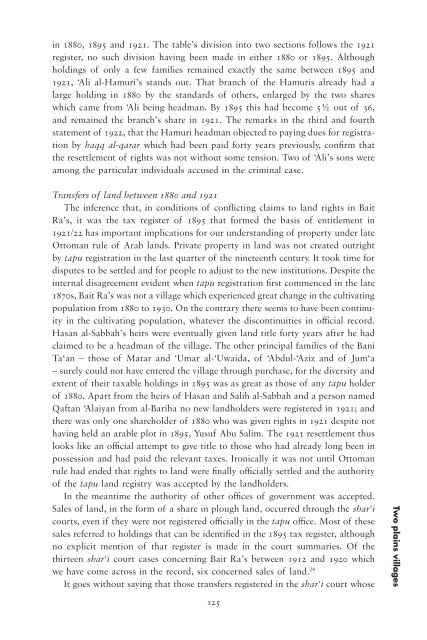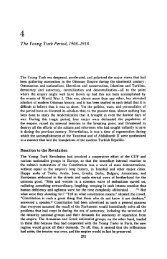Governing property, making the modern state - PSI424
Governing property, making the modern state - PSI424
Governing property, making the modern state - PSI424
Create successful ePaper yourself
Turn your PDF publications into a flip-book with our unique Google optimized e-Paper software.
in 1880, 1895 and 1921. The table’s division into two sections follows <strong>the</strong> 1921<br />
register, no such division having been made in ei<strong>the</strong>r 1880 or 1895. Although<br />
holdings of only a few families remained exactly <strong>the</strong> same between 1895 and<br />
1921, ‘Ali al-Hamuri’s stands out. That branch of <strong>the</strong> Hamuris already had a<br />
large holding in 1880 by <strong>the</strong> standards of o<strong>the</strong>rs, enlarged by <strong>the</strong> two shares<br />
which came from ‘Ali being headman. By 1895 this had become 5½ out of 36,<br />
and remained <strong>the</strong> branch’s share in 1921. The remarks in <strong>the</strong> third and fourth<br />
<strong>state</strong>ment of 1922, that <strong>the</strong> Hamuri headman objected to paying dues for registration<br />
by haqq al-qarar which had been paid forty years previously, confirm that<br />
<strong>the</strong> resettlement of rights was not without some tension. Two of ‘Ali’s sons were<br />
among <strong>the</strong> particular individuals accused in <strong>the</strong> criminal case.<br />
Transfers of land between 1880 and 1921<br />
The inference that, in conditions of conflicting claims to land rights in Bait<br />
Ra’s, it was <strong>the</strong> tax register of 1895 that formed <strong>the</strong> basis of entitlement in<br />
1921/22 has important implications for our understanding of <strong>property</strong> under late<br />
Ottoman rule of Arab lands. Private <strong>property</strong> in land was not created outright<br />
by tapu registration in <strong>the</strong> last quarter of <strong>the</strong> nineteenth century. It took time for<br />
disputes to be settled and for people to adjust to <strong>the</strong> new institutions. Despite <strong>the</strong><br />
internal disagreement evident when tapu registration first commenced in <strong>the</strong> late<br />
1870s, Bait Ra’s was not a village which experienced great change in <strong>the</strong> cultivating<br />
population from 1880 to 1930. On <strong>the</strong> contrary <strong>the</strong>re seems to have been continuity<br />
in <strong>the</strong> cultivating population, whatever <strong>the</strong> discontinuities in official record.<br />
Hasan al-Sabbah’s heirs were eventually given land title forty years after he had<br />
claimed to be a headman of <strong>the</strong> village. The o<strong>the</strong>r principal families of <strong>the</strong> Bani<br />
Ta‘an – those of Matar and ‘Umar al-‘Uwaida, of ‘Abdul-‘Aziz and of Jum‘a<br />
– surely could not have entered <strong>the</strong> village through purchase, for <strong>the</strong> diversity and<br />
extent of <strong>the</strong>ir taxable holdings in 1895 was as great as those of any tapu holder<br />
of 1880. Apart from <strong>the</strong> heirs of Hasan and Salih al-Sabbah and a person named<br />
Qaftan ‘Alaiyan from al-Bariha no new landholders were registered in 1921; and<br />
<strong>the</strong>re was only one shareholder of 1880 who was given rights in 1921 despite not<br />
having held an arable plot in 1895, Yusuf Abu Salim. The 1921 resettlement thus<br />
looks like an official attempt to give title to those who had already long been in<br />
possession and had paid <strong>the</strong> relevant taxes. Ironically it was not until Ottoman<br />
rule had ended that rights to land were finally officially settled and <strong>the</strong> authority<br />
of <strong>the</strong> tapu land registry was accepted by <strong>the</strong> landholders.<br />
In <strong>the</strong> meantime <strong>the</strong> authority of o<strong>the</strong>r offices of government was accepted.<br />
Sales of land, in <strong>the</strong> form of a share in plough land, occurred through <strong>the</strong> shar‘i<br />
courts, even if <strong>the</strong>y were not registered officially in <strong>the</strong> tapu office. Most of <strong>the</strong>se<br />
sales referred to holdings that can be identified in <strong>the</strong> 1895 tax register, although<br />
no explicit mention of that register is made in <strong>the</strong> court summaries. Of <strong>the</strong><br />
thirteen shar‘i court cases concerning Bait Ra’s between 1912 and 1920 which<br />
we have come across in <strong>the</strong> record, six concerned sales of land. 24<br />
It goes without saying that those transfers registered in <strong>the</strong> shar‘i court whose<br />
125<br />
Two plains villages












